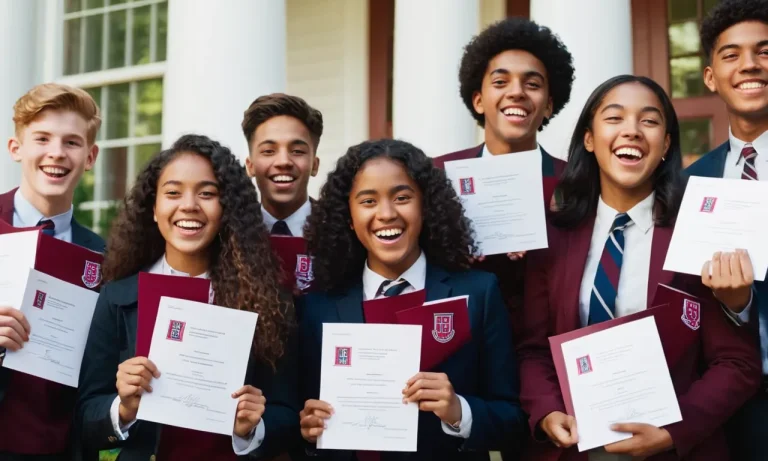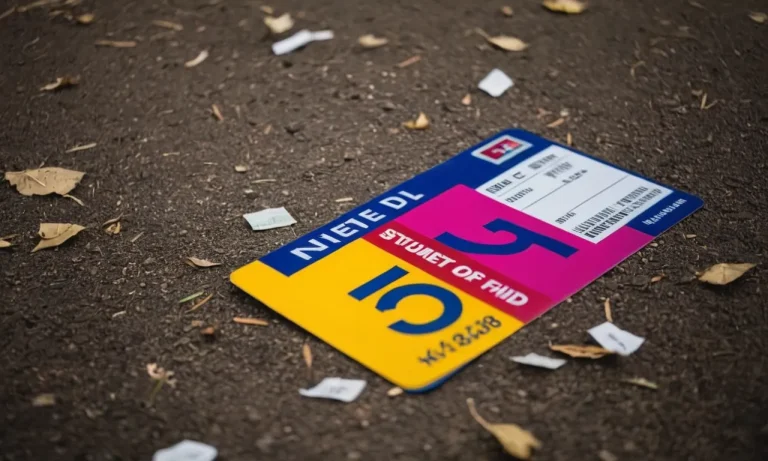Navigating the complex world of taxes can be a daunting task, especially for those who have never received formal education on the subject. It’s a question that has puzzled many: Why don’t schools teach taxes?
After all, understanding how to file taxes and manage personal finances is a crucial life skill that can have far-reaching consequences.
If you’re short on time, here’s a quick answer to your question: Schools generally don’t teach taxes because the curriculum is already packed with core subjects, and tax laws can vary significantly across different regions and countries.
However, there is a growing recognition of the importance of financial literacy, and some schools are starting to incorporate tax education into their curricula.
In this comprehensive article, we’ll delve into the reasons behind the lack of tax education in schools, explore the potential benefits of teaching taxes, and discuss possible solutions to bridge this gap.
We’ll also examine the role of parents, government initiatives, and online resources in promoting tax literacy among students.
The Overcrowded Curriculum Dilemma
One of the primary reasons why taxes are often overlooked in school curricula is the already packed academic schedules. With a plethora of subjects to cover, from core disciplines like mathematics, science, and language arts to electives like art, music, and physical education, there’s a constant struggle to fit everything into a limited time frame.
Schools face the daunting task of prioritizing what to include, and unfortunately, tax education often gets sidelined. According to a 2022 report from Education Week, the average high school student in the U.S. takes around seven courses per year, leaving little room for additional topics.
Packed Academic Schedules
The reality is that schools are under immense pressure to ensure students meet rigorous academic standards across a wide range of subjects. With so much ground to cover, it can be challenging to dedicate sufficient time to tax education, which is often perceived as a niche or specialized topic.
As a result, tax-related concepts are frequently relegated to brief mentions within other courses, such as math or social studies, rather than being given their own dedicated curriculum.
Prioritizing Core Subjects
Another factor contributing to the lack of tax education in schools is the emphasis placed on core subjects like reading, writing, and arithmetic. These foundational skills are rightfully prioritized, as they lay the groundwork for future academic success.
However, this focus can inadvertently push aside other important life skills, such as tax literacy. According to a 2021 IRS report, over 150 million individual tax returns were filed in the United States, highlighting the widespread need for tax knowledge.
Lack of Standardized Tax Curriculum
Furthermore, there is no widely adopted, standardized curriculum for teaching taxes in schools. While some states and individual school districts have made efforts to incorporate tax education into their curricula, these initiatives are often fragmented and inconsistent.
Without a unified, comprehensive approach, tax education remains a patchwork of isolated efforts, making it challenging to ensure consistent and high-quality instruction across different regions and schools.
😕 According to a 2022 EdWeek article, only a handful of states, such as Florida and Utah, have mandated personal finance courses that include tax education.
The Complexity of Tax Laws
One of the primary reasons why taxes aren’t extensively covered in school curriculums is the sheer complexity of tax laws and regulations. These legal frameworks are intricate, ever-evolving, and often vary significantly across regions and jurisdictions.
Attempting to teach such a vast and dynamic subject in a traditional classroom setting would be an immense challenge.
Constantly Evolving Tax Regulations
Tax laws are not static; they are constantly being updated and amended to adapt to changing economic conditions, government policies, and societal needs. Just as an example, the Internal Revenue Service (IRS) in the United States publishes an updated version of its Publication 17 – Your Federal Income Tax annually, which runs over 300 pages long.
Keeping up with these frequent changes would require a dedicated course that is continuously revised, making it impractical for most educational institutions.
Regional and National Variations
Tax systems can differ substantially between countries, states, and even municipalities. For instance, the tax rates, deductions, and filing requirements in California 🌉 can be quite different from those in Texas 🤠.
This regional variation adds another layer of complexity, making it challenging to develop a comprehensive tax curriculum that caters to all students’ specific local tax environments. As a result, many schools opt to provide a broad overview of taxation principles rather than delving into the intricacies of each jurisdiction.
Specialized Knowledge Required
Understanding and applying tax laws often requires specialized knowledge and expertise. Tax professionals, such as certified public accountants (CPAs) and enrolled agents, undergo extensive training and continuing education to stay up-to-date with the ever-changing tax landscape.
Attempting to cover this level of detail in a general education setting would be a daunting task, as it could easily overwhelm students and teachers alike.
Despite the challenges, some educational institutions do offer courses or modules related to personal finance and taxation. However, these are typically elective courses or specialized programs, rather than being part of the core curriculum.
Ultimately, the complexity of tax laws and the need for specialized knowledge make it difficult to incorporate comprehensive tax education into the already packed schedules of primary and secondary schools 🏫.
The Importance of Tax Education
In today’s complex financial landscape, tax education is a crucial aspect of personal finance that is often overlooked in traditional education systems. Failing to understand the intricacies of tax laws and obligations can have far-reaching consequences, both financially and legally.
That’s why it’s essential to equip individuals with the knowledge and skills necessary to navigate the tax realm effectively.
Financial Literacy and Independence
Tax education is a cornerstone of financial literacy, a fundamental skill that empowers individuals to make informed decisions about their finances. By understanding how taxes work and their impact on personal wealth, individuals can better plan for their financial goals, such as saving for retirement, purchasing a home, or starting a business.
This knowledge fosters a sense of independence and control over one’s financial future, reducing reliance on external sources and promoting self-sufficiency. According to a study by the National Endowment for Financial Education, individuals who receive financial education are more likely to engage in positive financial behaviors, such as budgeting, saving, and investing.
Avoiding Costly Mistakes
Navigating the complexities of tax laws can be a daunting task, and even minor mistakes can result in hefty penalties or legal consequences. Tax education equips individuals with the knowledge to accurately file tax returns, claim eligible deductions and credits, and comply with tax regulations.
By understanding the implications of various tax decisions, individuals can avoid costly errors and potentially save thousands of dollars in penalties or overpayments. According to the Internal Revenue Service (IRS), taxpayers collectively paid over $3.5 billion in penalties for failure to file or pay taxes on time in 2021.
Proper tax education could have helped many individuals avoid these penalties.
Promoting Responsible Citizenship
Taxes are a fundamental aspect of responsible citizenship, as they fund essential public services, infrastructure, and programs that benefit society as a whole. By educating individuals about the purpose and importance of taxes, we can foster a sense of civic responsibility and promote a more informed and engaged citizenry.
When people understand how their tax contributions are utilized, they are more likely to embrace their role in supporting the community and contributing to the greater good. According to a survey by the Tax Policy Center, 👍 over 60% of Americans believe that everyone should pay their fair share of taxes to support public services and programs.
Potential Solutions and Alternatives
Integrating Tax Education into Existing Curricula
One potential solution to address the lack of tax education in schools is to integrate it into existing curricula. This could involve incorporating tax-related topics into mathematics, economics, or personal finance courses.
For example, students could learn about tax calculations, filing procedures, and the importance of tax compliance while studying financial literacy. According to the Jump$tart Coalition for Personal Financial Literacy, only 21 states currently require students to take a personal finance course.
By making tax education a core component of such courses, schools can equip students with essential knowledge and skills for managing their finances and meeting their tax obligations.
Extracurricular Programs and Workshops
In addition to integrating tax education into existing curricula, schools could offer extracurricular programs and workshops specifically focused on tax literacy. These programs could be run in partnership with local tax professionals, accounting firms, or organizations like the Internal Revenue Service (IRS).
Students could learn about tax concepts, filing processes, and tax planning strategies through interactive workshops and hands-on activities. Extracurricular programs could also provide opportunities for students to gain practical experience by assisting in tax preparation for low-income individuals or participating in tax clinics.
According to a recent survey by the National Endowment for Financial Education, 89% of parents believe tax education should be taught in schools.
Online Resources and Self-Study Materials
With the rise of online education and self-study materials, tax education can also be facilitated through digital platforms. Schools could curate a collection of online resources, including educational videos, interactive modules, and tax preparation software, to help students learn about taxes at their own pace.
These resources could be made available on the school’s website or learning management system, allowing students to access them anytime, anywhere. Additionally, organizations like the IRS and tax software companies offer free online tax education resources that schools can leverage.
For example, Understanding Taxes by the IRS provides lesson plans and teaching materials for educators to incorporate tax education into their classrooms.
Parental Involvement and Guidance
While schools play a crucial role in tax education, parental involvement and guidance can also be invaluable. Parents can reinforce tax literacy concepts at home by discussing their own tax experiences, involving their children in the tax filing process, and encouraging them to explore tax-related topics.
Schools could also organize workshops or seminars for parents to educate them on tax basics, so they can better support their children’s learning. By fostering a collaborative approach between schools and parents, students can receive comprehensive tax education from multiple sources, increasing their chances of becoming financially literate and responsible taxpayers.
According to a study by the American Institute of CPAs, individuals who received tax education from both school and family were 42% more likely to file their taxes accurately and on time.
Conclusion
While the reasons for the lack of tax education in schools are multifaceted, the importance of equipping students with this essential life skill cannot be overstated. By addressing the overcrowded curriculum, acknowledging the complexity of tax laws, and exploring innovative solutions, we can empower future generations to navigate the intricate world of taxes with confidence.
Ultimately, tax literacy is not just about filing returns accurately; it’s about fostering financial responsibility, promoting civic engagement, and enabling individuals to make informed decisions that can have a lasting impact on their personal and professional lives.
By prioritizing tax education, we can pave the way for a more financially literate society, where individuals are better equipped to manage their finances and contribute to the overall economic well-being of their communities.






